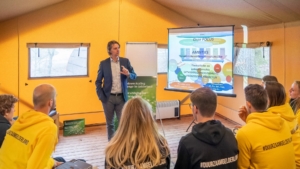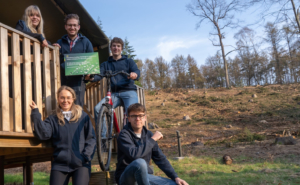Drawdown Scaling Challenge
April 2019
What happens if you apply the concept of TV programme Big Brother to the theme of climate change? Then you get ten young professionals staying for a week in a log cabin on a Dutch moor, brainstorming about serious CO2 reduction. Loendersloot was there.
Inspired by Paul Hawken’s book Drawdown, the Dutch province of Gelderland is aware thet more is needed regarding behavioral change on mobility to achieve the regional climate goals of the Paris Agreement. No matter how promising existing sustainable pilot projects are, scaling up innovation is essential!
From the 100 solutions offered by Drawdown, Gelderland Province selected a number of themes. A group with our business innovator Rens Jonker concentrated on the role of the bicycle in 2030. What needs to be done in terms of infrastructure, behavioral change and the economy in order to make the bicycle the first choice of transport for residents of the province of Gelderland by 2030?
Cycling in cities
The group’s first conclusion was that Gelderland Province, with many rural areas, is still very dependent on the car as a means of transport. It is therefore not so much a ‘cycling province’ in the Dutch sense. By focusing on cycling, especially in urban areas, it must be possible for Gelderland Province to become a ‘cycling province’ that also takes the car into account.
More space for the bicycle in the city is important according to the team of talents. Our business innovator Rens Jonker; “The average use of public space in the city for car traffic is 55%, while bicycle traffic currently only requires 12% of public space (according to Dutch statistics). This means that considerable progress can be made, certainly if you look at the use of space of one parking motorist in comparison to the use of space that is needed for a parked bicycle.”
Dynamic parking facilities
The talent team of the Drawdown Scaling Challenge mainly focused on more general cycling comfort. In particular, daily bike parking convenience for residents of old neighbourhoods without sheds and garages deserves attention. Jonker pointed to experiences in Brussels with temporary safe bike parking for fast and expensie E-bikes on public parking bays. Such experiments are also on-going in Rotterdam with a project with so-called ‘fietsvlonders’ (bike park platforms). In both cases, permanent parking facilities will only be initiated of the temporary facility is successful.



